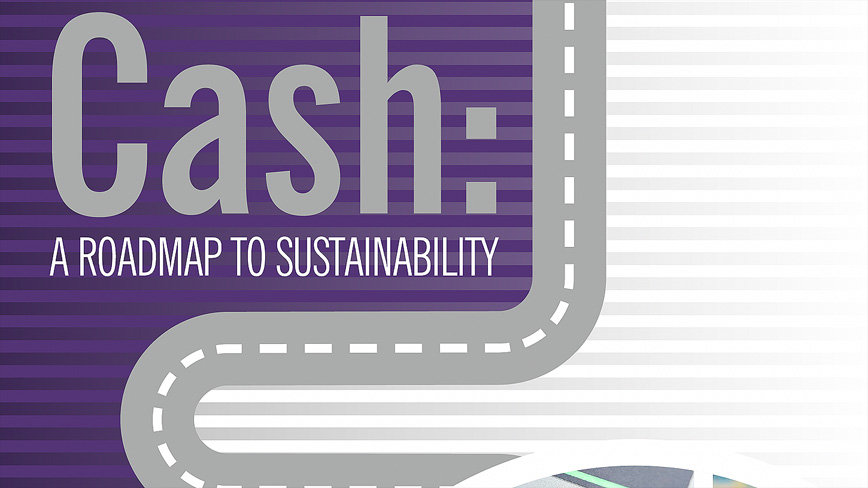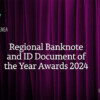The global cash industry – both manufacturers and cash management providers – is making huge strides in reducing its carbon footprint and securing a sustainable future for cash.
A new report – ‘Cash: Roadmap to Sustainability’ – highlights the progress in the last decade and innovative developments underway. It challenges some of the myths and misconceptions about the industry, while also shining a light on the digital payments sector.
The report challenges any idea that digital payments are a low carbon impact alternative to cash. The huge energy consumption needed for crypto currency is already well reported.
The report reveals an industry that has dramatically changed and is heavily investing to reduce its impact on the environment. It looks at the impact of cash in terms of carbon, resources used and pollution.
A fact it highlights is that while paying cash for a 40g bar of milk chocolate uses approximately 4.6g of CO2e (ie. carbon dioxide equivalent), the CO2e involved in the production of that bar of chocolate is 200g.
The new report has been produced by business intelligence consultancy Reconnaissance to coincide with international climate change conference COP 26, meeting in Glasgow in November.
The UK is well positioned globally and has already taken a lead by launching the first ever Cash Industry Environment Charter to deliver a sustainable future for cash and tackle its impact on the climate.
Irrespective of the move towards digital payments around the world, cash remains a key pillar in the payments eco-system; every person on the planet uses cash and most of the world’s population depends on it. Cash usage continues to grow in most countries. In this context the report is an important record of the progress made to ensure cash is environmentally sustainable, says author John Winchcombe.
Some 24 organisations have contributed 106 case studies on changes that they have made to reduce their environmental impact and the results that have been achieved.
John Winchcombe says: “This document shares best practice with the global cash industry of what is possible, demonstrating that industries are listening, acting and making a real difference. Change is happening.
“Unusually, this is an industry that is changing through choice. There is little actual customer demand or government legislation at this stage forcing them to change. There is a genuine momentum across the cash industry to be a good citizen.”
He highlighted that every contributor to the report demonstrated an awareness of the need to act responsibly and show hard evidence of change and improvements they are making.
An analysis of the different projects undertaken across the cash cycle that the report covers reveals 10 organisations that are sourcing 100% renewable energy; and seven organisations that have invested in solar, hydro, wind and tidal power. All cash in transit companies have invested in telematics to reduce fossil fuel usage and the same companies have started trials with electric or hybrid vehicles.
Some projects and examples range from the simple change to LED lighting, to the more complex, changing from single use plastic seals to cloth bags, to those based on major capital equipment and investment decisions.
Winchcombe added: “There is no greenwashing here. All the contributors to this report are taking action and devoting time and resources and investing to do better. The cash industry is taking a strong lead, not just in the UK but other parts of the world. More can be done, and more is planned. The industry is on a journey and has mapped out a sustainable future.”
Cash is physical and therefore visible, he explained, adding that the alternative digital payments are not, and therefore assumed to be low impact. However, Winchcombe challenges this assertion: “While the carbon footprint of digital payments is hard to quantify, it does require substantial hardware, software and considerable energy consumption for payment data processing, data management and communications.”
He added: “As the number of digital transactions rises, particularly those made using mobile devices and digital wallets, at the absolute rather than the per transaction level the digital impact is increasing very significantly.”
Astrid Mitchell, CEO of Reconnaissance, said: “This is an important report in the context of where currency and coins are in society and the environment. Coins and notes offer choice, freedom and financial inclusion for billions of people across the world. But equally the future for payments is rapidly evolving. Above all, cash needs to be relevant, accessible, cost-effective, secure and increasingly low carbon in terms of production and circulation. This report puts a marker down to show the progress made and to be able to measure future strides that the industry is committed to taking.”
Reconnaissance has organised a webinar – on November 2 at 12pm GMT – with leaders from the cash industry to discuss the ‘Cash: Roadmap to Sustainability’ report. It will highlight what has been done to reduce the sector’s environmental impact, where energy has been focused and the benefits. It shows an industry not driven by legislation or customer demand, but one doing the right thing for the right reasons. For more details visit Webinar: Cash: a Roadmap to Sustainability by Reconnaissance Intl. (bigmarker.com)










